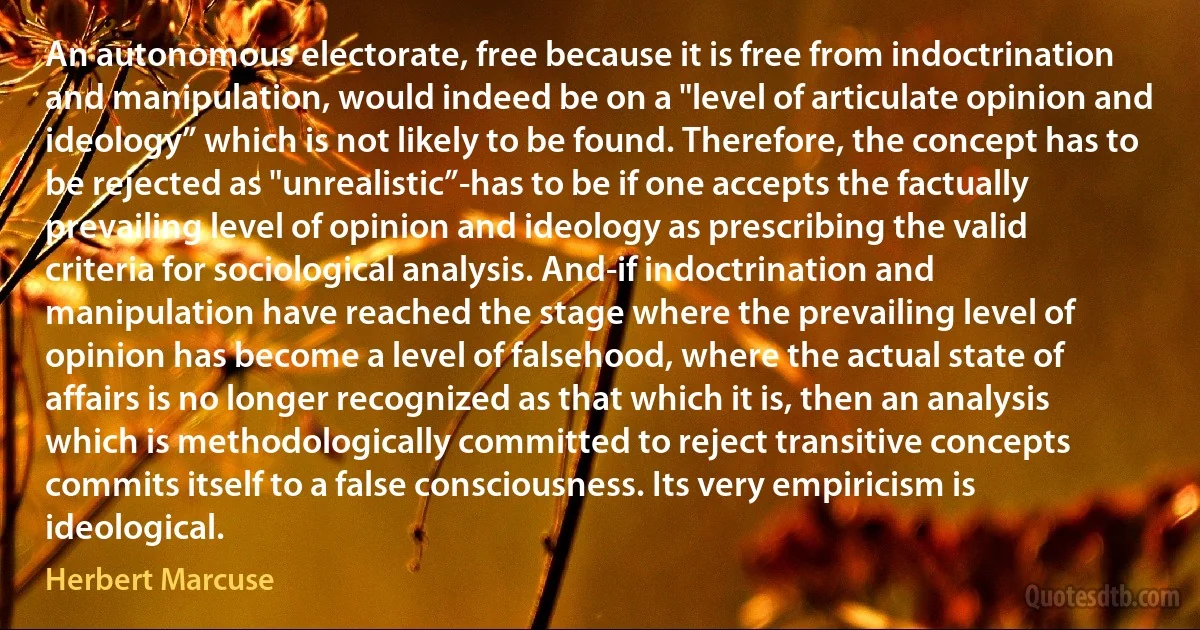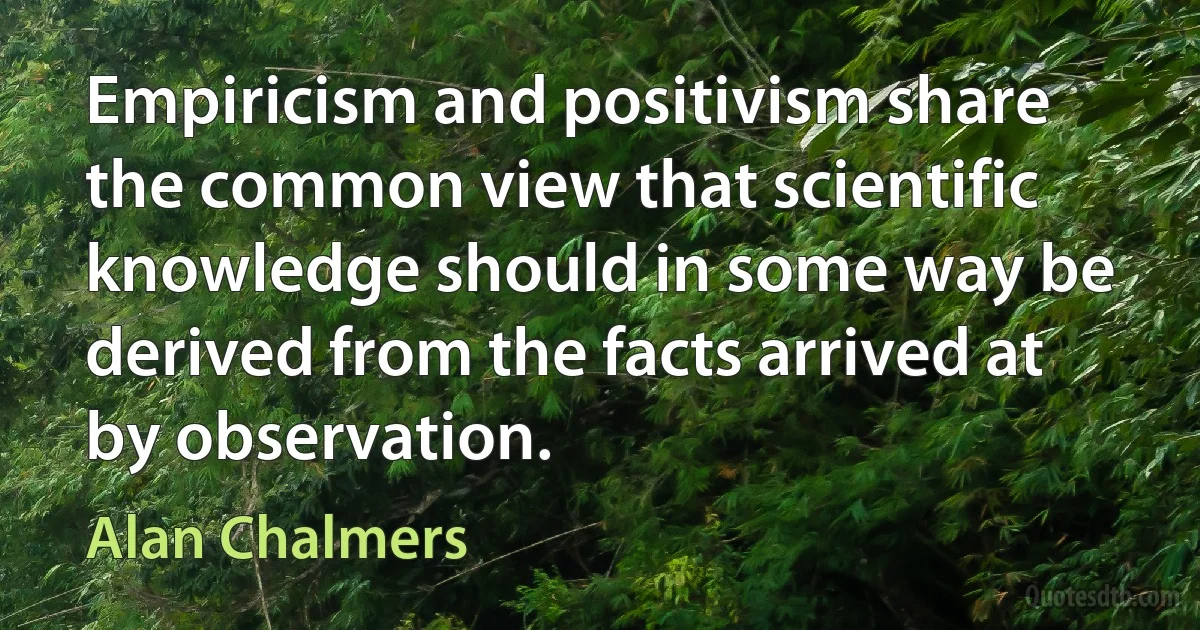Empiricism Quotes
History is mere Empiricism; it has only facts to communicate, and all its proofs are founded upon facts alone. To attempt to rise to Primeval History on this foundation of fact, or to argue by this means how such or such a thing might have been, and then to take for granted that it has been so in reality,is to stray beyond the limits of History, and produce an a priori History; just as the Philosophy of Nature, referred to in our preceding lecture, endeavoured to find an a priori Science of Physics.

Johann Gottlieb Fichte
Modern empiricism has been conditioned in large part by two dogmas. One is a belief in some fundamental cleavage between truths which are analytic, or grounded in meanings independently of matters of fact, and truths which are synthetic, or grounded in fact. The other dogma is reductionism: the belief that each meaningful statement is equivalent to some logical construct upon terms which refer to immediate experience. Both dogmas, I shall argue, are ill-founded. One effect of abandoning them is, as we shall see, a blurring of the supposed boundary between speculative metaphysics and natural science. Another effect is a shift toward pragmatism.

Willard van Orman Quine
And if the immortality of the soul had been unable to find vindication in rational empiricism, neither is it satisfied with pantheism. To say that everything is God, and that when we die, we return to God, or more accurately, continue in Him, avails our longing nothing; for if this indeed be so, then we were in God before we were born, and if we die we return to where we were before being born, then the human soul, the individual consciousness, is perishable. And since we know very well that God, the personal and conscious God of Christian monotheism, is simply the provider, and above all the guarantor, of our immortality, pantheism is said, and rightly said to be merely atheism disguised; and in my opinion, undisguised.

Miguel de Unamuno
To consider the city as the projection of society on space is both an indispensible starting point and too elementary an approach. For, although one must go beyond the empiricism of geographical description, one runs the very great risk of imagining space as a white page on which the actions of groups and institutions are inscribed, without encountering any other obstacle than the trace of past generations. This is tantamount to conceiving of nature as entirely fashioned by culture, whereas the whole social problematic is born by the indissoluble union of these two terms, through the dialectical process by which a particular biological species (particularly because divided into classes) "man", transforms himself and transforms his struggle for life and for the appropriation of the product of his labour.

Manuel Castells
Logical empiricism holds the view, notwithstanding some its assertions, that the forms of knowledge and consequently the relations of man to nature and to other men never change. According to rationalism, too, all subjective and objective potentialities are rooted in insights which the individual already possesses, but rationality uses existing objects as well as the active inner striving and ideas of man to construct standards for the future. In this regard, it is not so closely associated with the present order as is empiricism.

Max Horkheimer
Pantheism makes God into a present, real, and material being; empiricism – to which rationalism also belongs – makes God into an absent, remote, unreal, and negative being. Empiricism does not deny God existence, but denies him all positive determinations, because their content is supposed to be only finite and empirical; the infinite cannot, therefore, be an object for man. But the more determinations I deny to a being, the more do I cut it of[ from myself, and the less power and influence do I concede to it over me, the freer do I make myself of it. The more qualities I possess, the more I am for others, and the greater is the extent of my influence and effects. And the more one is, the more one is known to others. Hence, each negation of an attribute of God is a partial atheism, a sphere of godlessness.

Ludwig Andreas Feuerbach
No criticism can be brought against a branch of technical science from outside; no thought fitted out with the knowledge of a period and setting its course by definite historical aims could have anything to say to the specialist. Such thought and the critical, dialectical element it communicates to the process of cognition, thereby maintaining conscious connection between that process and historical life, do not exist for empiricism; nor do the associated categories, such as the distinction between essence and appearance, identity in change, and rationality of ends, indeed, the concept of man, of personality, even of society and class taken in the sense that presupposes specific viewpoints and directions of interest.

Max Horkheimer
Carnap, who has so far probably advanced the work of the Vienna Circle the most towards empiricism, made an attempt to create a constitutive constructive system; in this he distinguished two languages: a ‘monologizing' (phenomenalist) one and an ‘intersubjective' (physicalist) one. He tries to deduce the physical one from the phenomenalist.

Otto Neurath
The members of the Vienna Circle (Moritz Schlick, Rudolf Carnap, Philipp Frank, Hans Hahn, Herbert Feigl, Fritz Waismann, Kurt Godel, Otto Neurath and others) are working out a ‘Logical Empiricism'. Following Ernst Mach and Poincaré, but above all Russell and Wittgenstein, all the sciences are treated uniformly. Carnap's Logischer Aufbau der Welt (1928) shows in which direction future systematic work will move. Wittgenstein's Tractatus Logico-Philosophicus (1921) clarified, among other things, the position of logic and mathematics; besides the statements that make additions to what is meaningful, there are the ‘tautologies' that show us which transformations are possible within language. By its syntax the language of science excludes anything that is meaningless from the very beginning.

Otto Neurath
[This view is contrasted with all forms of Empiricism, by which it is] assumed that development is uniform across (cognitive) domains, and that the intrinsic properties of the initial state (of the mind) are homogeneous and undifferentiated - an assumption found across a spectrum reaching from Skinner to Piaget.

Noam Chomsky
Many people think that the progress of the human race is based on experiences of an empirical, critical nature, but I say that true knowledge is to be had only through a philosophy of deduction. For it is intuition that improves the world, not just following a trodden path of thought. Intuition makes us look at unrelated facts and then think about them until they can all be brought under one law. To look for related facts means holding onto what one has instead of searching for new facts. Intuition is the father of new knowledge, while empiricism is nothing but an accumulation of old knowledge. Intuition, not intellect, is the 'open sesame' of yourself.

Albert Einstein
Science in the past (and partly in the present), was dominated by one-sided empiricism. Only a collection of data and experiments were considered as being ‘scientific' in biology (and psychology); forgetting that a mere accumulation of data, although steadily piling up, does not make a science.

Ludwig von Bertalanffy
Humanity cannot progress by importing into theoretical study the processes of blind routine and haphazard experiment by which production has so long been dominated. ... The true relation between theory and application only appears when theoretical research has been purged of all empiricism.

Simone Weil
It's so hard to believe in anything anymore, you know what I mean? It's like, religion, you really can't take it seriously, 'cause it seems so mythological, and seems so arbitrary; and then on the other hand, science is just pure empiricism, and by virtue of its method, it excludes metaphysics. I guess I wouldn't believe in anything if it weren't for my lucky astrology mood watch.

Steve Martin
Men of broader intellect know that there is no sharp distinction betwixt the real and the unreal; that all things appear as they do only by virtue of the delicate individual physical and mental media through which we are made conscious of them; but the prosaic materialism of the majority condemns as madness the flashes of super-sight which penetrate the common veil of obvious empiricism.

H. P. Lovecraft
The theory of empiricism is plausible because it assumes that accuracy about small matters prepares the way for valid judgment about large ones. What happens, however, is that the judgments are never made. The pedantic empiricist, buried in his little province of phenomena, imagines that fidelity to it exempts him from concern with larger aspects of reality.

Richard Weaver
![My interests drew me in different directions. On the one hand I was powerfully attracted by science, with its truths based on facts; on the other hand I was fascinated by everything to do with comparative religion. [...] In science I missed the factor of meaning; and in religion, that of empiricism. (Carl Jung)](https://cdn.quotesdtb.com/img/quotes_images_webp/40/carl-jung-based-comparative-135240.webp)


